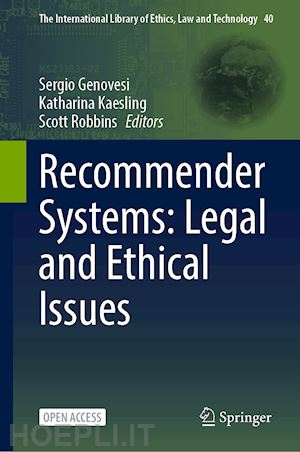
Questo prodotto usufruisce delle SPEDIZIONI GRATIS
selezionando l'opzione Corriere Veloce in fase di ordine.
Pagabile anche con Carta della cultura giovani e del merito, 18App Bonus Cultura e Carta del Docente
This open access contributed volume examines the ethical and legal foundations of (future) policies on recommender systems and offers a transdisciplinary approach to tackle important issues related to their development, use and integration into online eco-systems. This volume scrutinizes the values driving automated recommendations - what is important for an individual receiving the recommendation, the company on which that platform was received, and society at large might diverge. The volume addresses concerns about manipulation of individuals and risks for personal autonomy. From a legal perspective, the volume offers a much-needed evaluation of regulatory needs and lawmakers’ answers in various legal disciplines. The focus is on European Union measures of platform regulation, consumer protection and anti-discrimination law. The volume will be of particular interest to the community of legal scholars dealing with platform regulation and algorithmic decision making. By including specific use cases, the volume also exposes pitfalls associated with current models of regulation. Beyond the juxtaposition of purely ethical and legal perspectives, the volume contains truly interdisciplinary work on various aspects of recommender systems.
Chapter 1: Introduction: Understanding and Regulating Al-Powered Recommender systems.- Part I: Fairness and Transparency.- Chapter 2: Recommender Systems and Discrimination.- Chapter 3: From Algoritmic Transparency to Algorithmic Choice: European Perspectives on Recommender Systems and Platform Regulation.- Chapter 4: Black Hole instead of Black Box? - The Double Opaqueness of Recommender Systems on Gaming Platforms and its Legal Implications.- Chapter 5: Digital Labor as a Structural Fairness Issue in Recommender Systems.- Part II: Manipulation and Personal Autonomy.- Chapter 6: Recommender Systems, Manipulation and Private Autonomy - How European civil law regulates and should regulate recommender systems for the benefit of private autonomy.- Chapter 7: Reasoning with Recommender Systems? Practical Reasoning, Digital Nudging, and Autonomy.- Chapter 8: Recommending Ourselves to Death: values in the age of algorithms.- Part III: Designing and Evaluating Recommender Systems.- Chapter 9: Ethical and Legal Analysis of Machine Learning Based Systems: A Scenario Analysis of a Food Recommender System.- Chapter 10: Factors influencing trust and use of recommendation AI: A case study of diet improvement AI in Japan.- Chapter 11: Ethics of E-Learning Recommender Systems: Epistemic Positioning and Ideological Orientation.
Sergio Genovesi is a Post-Doctoral Research Fellow at the Center for Science and Thought of the University of Bonn in Germany. He is also a team member in the KI.NRW flagship project “Zertifizierte KI” (Certified AI), which is founded Ministry of Economic Affairs, Industry, Climate Action and Energy of the state of North Rhine-Westphalia. He completed his PhD in theoretical philosophy at the University of Bonn. During his graduate studies he conducted research at the Universities of Chicago, Paris, Bonn, Heidelberg and Turin.
Katharina Kaesling is Tenure-Track Junior Professor of Civil Law, Intellectual Property, especially Patent Law, and Legal Issues of AI at the University of Dresden (TU), Germany. She is a Member of the Board of Directors of the Research Center for Legal Issues of New Technologies as well as Data Law (ForTech) in Bonn. From 2017 to 2022, she was Research Coordinator at the Käte Hamburger Center for Advanced Study in the Humanities “Law as Culture” at the University of Bonn, Germany. Her comparative law dissertation has won several awards, including the prize for the best dissertation of the law department of the University of Bonn. She holds a Ph.D. in law from the University of Bonn, a Master of Laws from the College of Europe (Bruges) as well as the First German Examination in Law (University of Bonn/ Higher Regional Court Cologne) and the Second State Examination in Law (Ministry of Justice of North Rhine-Westphalia).
Scott Robbins is a Post-Doctoral Research Fellow at Bonn University in Germany. Scott completed his PhD in the ethics of artificial intelligence at the Technical University of Delft (title: Machine Learning & Counter-Terrorism: ethics, efficacy, and meaningful human control). He has a B.Sc. in Computer Science from California State University, Chico and an M.Sc. in Ethics of Technology from the University of Twente. He is a founding member of the Foundation for Responsible Robotics and a member of the 4TU Centre for Ethics and Technology. Scott is skeptical of AI as a grand solution to societal problems and argues that AI should be boring.











Il sito utilizza cookie ed altri strumenti di tracciamento che raccolgono informazioni dal dispositivo dell’utente. Oltre ai cookie tecnici ed analitici aggregati, strettamente necessari per il funzionamento di questo sito web, previo consenso dell’utente possono essere installati cookie di profilazione e marketing e cookie dei social media. Cliccando su “Accetto tutti i cookie” saranno attivate tutte le categorie di cookie. Per accettare solo deterninate categorie di cookie, cliccare invece su “Impostazioni cookie”. Chiudendo il banner o continuando a navigare saranno installati solo cookie tecnici. Per maggiori dettagli, consultare la Cookie Policy.